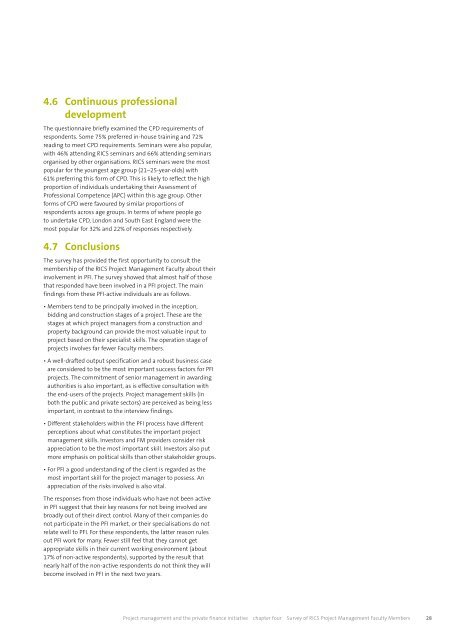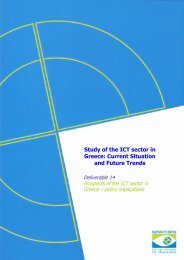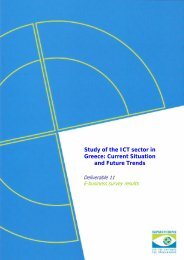Project management and the private finance initiative
Project management and the private finance initiative
Project management and the private finance initiative
You also want an ePaper? Increase the reach of your titles
YUMPU automatically turns print PDFs into web optimized ePapers that Google loves.
4.6 Continuous professional<br />
development<br />
The questionnaire briefly examined <strong>the</strong> CPD requirements of<br />
respondents. Some 75% preferred in-house training <strong>and</strong> 72%<br />
reading to meet CPD requirements. Seminars were also popular,<br />
with 46% attending RICS seminars <strong>and</strong> 66% attending seminars<br />
organised by o<strong>the</strong>r organisations. RICS seminars were <strong>the</strong> most<br />
popular for <strong>the</strong> youngest age group (21–25-year-olds) with<br />
61% preferring this form of CPD. This is likely to reflect <strong>the</strong> high<br />
proportion of individuals undertaking <strong>the</strong>ir Assessment of<br />
Professional Competence (APC) within this age group. O<strong>the</strong>r<br />
forms of CPD were favoured by similar proportions of<br />
respondents across age groups. In terms of where people go<br />
to undertake CPD, London <strong>and</strong> South East Engl<strong>and</strong> were <strong>the</strong><br />
most popular for 32% <strong>and</strong> 22% of responses respectively.<br />
4.7 Conclusions<br />
The survey has provided <strong>the</strong> first opportunity to consult <strong>the</strong><br />
membership of <strong>the</strong> RICS <strong>Project</strong> Management Faculty about <strong>the</strong>ir<br />
involvement in PFI. The survey showed that almost half of those<br />
that responded have been involved in a PFI project. The main<br />
findings from <strong>the</strong>se PFI-active individuals are as follows.<br />
• Members tend to be principally involved in <strong>the</strong> inception,<br />
bidding <strong>and</strong> construction stages of a project. These are <strong>the</strong><br />
stages at which project managers from a construction <strong>and</strong><br />
property background can provide <strong>the</strong> most valuable input to<br />
project based on <strong>the</strong>ir specialist skills. The operation stage of<br />
projects involves far fewer Faculty members.<br />
• A well-drafted output specification <strong>and</strong> a robust business case<br />
are considered to be <strong>the</strong> most important success factors for PFI<br />
projects. The commitment of senior <strong>management</strong> in awarding<br />
authorities is also important, as is effective consultation with<br />
<strong>the</strong> end-users of <strong>the</strong> projects. <strong>Project</strong> <strong>management</strong> skills (in<br />
both <strong>the</strong> public <strong>and</strong> <strong>private</strong> sectors) are perceived as being less<br />
important, in contrast to <strong>the</strong> interview findings.<br />
• Different stakeholders within <strong>the</strong> PFI process have different<br />
perceptions about what constitutes <strong>the</strong> important project<br />
<strong>management</strong> skills. Investors <strong>and</strong> FM providers consider risk<br />
appreciation to be <strong>the</strong> most important skill. Investors also put<br />
more emphasis on political skills than o<strong>the</strong>r stakeholder groups.<br />
• For PFI a good underst<strong>and</strong>ing of <strong>the</strong> client is regarded as <strong>the</strong><br />
most important skill for <strong>the</strong> project manager to possess. An<br />
appreciation of <strong>the</strong> risks involved is also vital.<br />
The responses from those individuals who have not been active<br />
in PFI suggest that <strong>the</strong>ir key reasons for not being involved are<br />
broadly out of <strong>the</strong>ir direct control. Many of <strong>the</strong>ir companies do<br />
not participate in <strong>the</strong> PFI market, or <strong>the</strong>ir specialisations do not<br />
relate well to PFI. For <strong>the</strong>se respondents, <strong>the</strong> latter reason rules<br />
out PFI work for many. Fewer still feel that <strong>the</strong>y cannot get<br />
appropriate skills in <strong>the</strong>ir current working environment (about<br />
17% of non-active respondents), supported by <strong>the</strong> result that<br />
nearly half of <strong>the</strong> non-active respondents do not think <strong>the</strong>y will<br />
become involved in PFI in <strong>the</strong> next two years.<br />
<strong>Project</strong> <strong>management</strong> <strong>and</strong> <strong>the</strong> <strong>private</strong> <strong>finance</strong> <strong>initiative</strong> chapter four Survey of RICS <strong>Project</strong> Management Faculty Members<br />
28

















